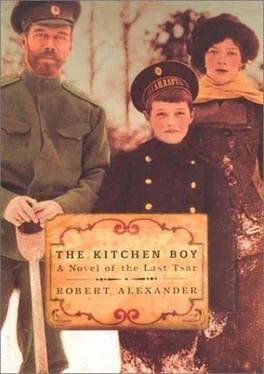Several moments later, however, I heard the door of the water closet thrown open, and then Tatyana Nikolaevna, like a fast moving summer storm, swept back through the kitchen, her eyes cast to the floor. There were bright blooms of red spread across her face – again, so much like her mother whose emotions manifested themselves physically – while behind her came the guard, laughing deeply as he stroked his stringy beard. What untoward actions had he taken? Had he cornered the young woman, tried to kiss her, as one of them had tried to embrace Maria just last week?
I glanced through the hall, into the dining room. I saw nothing, but heard a flurry of low voices, the swishing of dresses. A few moments passed before Nikolai Aleksandrovich himself came storming along the same route. Wearing his army tunic and tall leather boots, of course, he passed through the kitchen, his face grave. Behind him came the same guard, still laughing, still stroking his beard. Although I was all but invisible to both of them, I watched as the ex-Tsar moved with great determination into the water closet. He remained there longer than his daughter. A good deal longer.
I lit the samovar, vented the smoke out the window. I blew on the twigs, made sure the flame was fine and strong. And then I heard Nikolai Aleksandrovich emerge, heard him march my way, his pace steady, controlled, firm. Almost like a robot he passed me by, his face stony and void of expression. Many people have described the Tsar as such, that when bad news was delivered upon him they were surprised by his lack of reaction, lack of emotion. Some great ministers and foreign dignitaries mistook this as a lack of caring and feeling, a weak-willed passivity or deep-seated fatalism. But they were all wrong. Nikolai Aleksandrovich was deeply emotional, extraordinarily caring. And also a firm believer that the Tsar of All the Russias must maintain absolute control – control of every little item on his desk, control of his own calendar and appointments, and above all, supreme among most manly things, control of his personal feelings. All this while deep inside so much was seething, all of which he expressed only to his wife. Yes, a passionate, loving man – which is made clear in the thousands of letters he left behind – but as he moved on by, not an inkling of emotion could I detect on that man’s practiced face. I did notice something, however: his hands. They were blackened, and he was rubbing them together, trying desperately to wipe something away.
Unable to contain myself, I quickly peered into the center of the samovar and saw that the blaze was going well. I then glanced into the dining room, spying nothing. While all of the Romanovs needed a guard to escort them to the water closet or the bathing room, I did not. And so that is exactly where I went, to the very place where the Tsar had just gone on foot. Passing through the house, I reached the far corner, where I paused, heard the guards’ deep voices – was that groggy one Komendant Avdeyev? – then reached for the door of the water closet. And thereupon entered a small chamber of surprise.
Russians can be witty. They can be cruel. And they find keen delight in the grotesque marriage of the two. Many things had I heard in jest about Nikolai – “We had a revolution not because we wanted a limited monarchy, but because we had a limited monarch” – but here on the walls of the water closet were things that my youthful mind had never conjured. On the wall across from the ceramic sink was painted a demonic man, his hair long and scraggly, his beard twisted and foul. He was naked, and rising from between his legs was a gigantic, erect penis which he was shoving into the crack of a woman who herself wore nothing but a large, bejeweled crown. Above him was written the name “Grisha,” while on her crown was enscribed “Shura.” Sure, in this tiny chamber the angry Red guards had portrayed the man they believed had soiled the dynasty and brought down the empire, Grigory Rasputin, fornicating with that traitor to the motherland, the German bitch, Empress Aleksandra Fyodorovna. Nearby, watching the scene with robust delight, was an effeminate, chubby, bearded man with droopy breasts – the Emperor Nikolai II – who sat in a tub overflowing with German marks and American dollars. It was done in big bold strokes of black paint. Permanent paint. That much was obvious because the Tsar had used a wet hand to try to wipe it away, though it had proved impossible to do little more than lightly smear the graphic mural.
But there was more.
Most of the guards had never before seen a toilet, let alone used one, and had taken to using this one by standing on the seat itself and squatting. In light of the numerous muddy footprints left behind on the seat, the Empress had had her maid place a cultured sign above the toilet that read: “Be so kind as to leave the toilet as clean as you found it.” But that did little good, because most of the guards couldn’t read, either. In any case, to the side and written directly on the wall was a little ditty:
TO ALL HIS PEOPLES NIKOLAI SAID
AS FOR A REPUBLIC, GO FUCK YOURSELVES INSTEAD
SO OUR RUSSIAN TSAR CALLED NICK
WE DRAGGED FROM HIS THRONE BY HIS DICK
To myself I mumbled aloud the last two lines – “ Tsaria russkogo Nikolu, Za khuy sdernuli s prestolu” – and I began to shake. Such rudeness was unbelievable – to this day it’s still forbidden in Russia to even publish the word khuy . And, I started to cry, not so much out of fear, but because for the first time I grasped how horrid a world lay ahead if, in fact, I survived.
Yes, the image and little ditty remained all the way to the end, and, in fact, were added to as the days fell away, with slogans like, “Crush the Crowns of the Tsar, Tear Apart the Old World,” “Death to the Blood Drinker,” “To Hell with Kapitalizm ,” “Crush International Imperialism.” All these did the Romanovs see in the water closet. Day after day, whenever they went to relieve themselves, they were surrounded with this hatred. I have no idea what they thought, what they felt, as they – father, mother, son, and daughters – went into that small chamber one after the other and sat there alone and half-naked as the hatred bore down upon them from all sides. And yet, the Romanovs suffered well. Not a protest did they make, not a word did they complain. They read their Bibles, they chanted their prayers, they bowed to their icons.
Yet that morning there was still a chance of rescue. And a chance meant hope. No, Nikolai did not want to be rescued from that special house and restored to the brilliancy of the Romanov throne, of this I am absolutely certain. If so many of his peoples felt locked in the chains of poverty, then he felt entrapped by the riches of the dynasty, which is to say that peasant and Tsar alike were liberated by the revolution. Yes, many have said, and I do believe it to be true, that Nikolai bloomed after his abdication.
The call of nature ruled all, of course, and one by one all of the Romanovs visited the water closet by eight of that morning, that is to say within the thirty minutes left before our inspection. Not a word of protest did they make, however – at least not outwardly, not that could be heard by any of their guards, or even us, their small retinue, consisting of Dr. Botkin, the maid, Demidova, the footman Trupp, the cook, Kharitonov, and me, the kitchen boy. I watched all the rest of them – the Empress, the Heir Tsarevich, and the other three daughters – as they passed through the kitchen to the facilities, escorted, as they all were, by a guard. To generalize, if they appeared full of trepidation as they headed for the toilet room, then they seemed shocked upon their return. In all that I’ve learned, the thing that surprised Nikolai and Aleksandra the most about his abdication, the one aspect that crushed their hearts, was definitely not the loss of power and wealth, but the realization of how widely hated they were. And by this I mean not by the court, but the narod – the masses – whose emotions were so deeply stirred by the centuries of inequity and darkly spiced by the poisonous propaganda of the Bolsheviki .
Читать дальше












